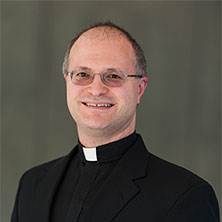
Brian Muzás , Ph.D.
Assistant Professor of Diplomacy and International Relations
School of Diplomacy and International Relations
(973) 313-6022
Email
McQuaid Hall
Room 101D
Brian Muzás, Ph.D.
Assistant Professor of Diplomacy and International Relations
School of Diplomacy and International Relations
Brian Keenan Muzás never outgrew his childhood love of planes and rockets. He graduated summa cum laude with a B.S.E. in mechanical and aerospace engineering from Princeton University in 1996. Although a graduate-level course in energy and environmental policy at Princeton's Woodrow Wilson School of Public and International Affairs foreshadowed his future enrollment in the doctoral program at the Lyndon B. Johnson School of Public Affairs at the University of Texas at Austin, he first used a National Science Foundation Fellowship to obtain an M.S. in aeronautics from the California Institute of Technology in 1998. He then entered seminary. After receiving an M.Div. in pastoral ministry, an M.A. in systematic theology, and two John Paul II Medals for academic accomplishment at Seton Hall University, Father Muzás was ordained a Catholic priest in 2003. Assigned to a parish, Father Muzás used his days off variously to teach computer science at Seton Hall or to serve as co-chairman of an NGO conference committee at the United Nations.
In 2007 Father Muzás was assigned to the priest community at Seton Hall University where he served for a year as a full-time adjunct in the School of Diplomacy and International Relations. Despite such well-rounded activities, it was a Harrington Fellowship that ultimately allowed Father Muzás to pursue scholarship at UT Austin that drew on all aspects of his background; he graduated with his Ph.D. in Public Policy in 2013.
Father Muzás' research interests include international security, defense systems, and ethics, and he is currently exploring how religious cultural heritage has influenced nuclear decisions in the past in order to better understand similar issues today.
Father Muzás has taught courses in international conflict and security, comparative foreign policy, and sustainable development at Seton Hall; this year, in addition to teaching in the undergraduate core curriculum, he is offering a variety of graduate and undergraduate courses in human security, international relations theory, statecraft, and nuclear weapons in the international system.
Education
- Ph.D. in Public Policy, The University of Texas at Austin
- M.A. in Theology and M.Div. in Pastoral Ministry, Seton Hall University
- M.S. in Aeronautics, California Institute of Technology
- B.S.E. in Mechanical and Aerospace Engineering, Princeton University
Scholarship
- “A Bottle of Wisdom, a Barrel of Prudence, and an Ocean of Patience: Vatican Mediation and the Beagle Channel Conflict.” Journal of Conflict Resolution. (Forthcoming)
- “The Influence of Religious Cultural Heritage on President Truman, the Iran Crisis of 1946, and International Control of Nuclear Technology.” The International Journal of Interdisciplinary Civic and Political Studies, 12(4), 9-23. 2018
- “O Kings (Presidents?), Show Discernment: Religious Cultural Heritage and Foreign Policy in the Reagan and Trump Eras.” Texas National Security Review, 2018
- “People-Centered Multilateralism: A Call to Action.” New York, NY: UN Department of Public Information (now Department of Global Communications). 2018
- “Religious Cultural Heritage and the Decision-making Framework of President Harry Truman.” The International Journal of Interdisciplinary Civic and Political Studies, 11(2), 19-27. 2016
Accomplishments
- Doctoral Fellow, Donald D. Harrington Endowment, The University of Texas at Austin (2008-2013).
- Dissertation Completion Fellowship, The University of Texas at Austin (2013).
- Winner, John Paul II Medal for Highest Academic Achievement, M.A. Program, Immaculate Conception Seminary School of Theology, Seton Hall University (2003).
- Winner, John Paul II Medal for Highest Academic Achievement, M.Div. Program, Immaculate Conception Seminary School of Theology, Seton Hall University (2003).
- Winner, Archbishop Peter Leo Gerety Award for Research in Church History (1998-1999).
- Winner, Médaille Pierre CONTENSOU, Association Aéronautique et Astronautique de France, 47th Congress, International Astronautical Federation, Beijing, China (1996).
- Student Representative, American Institute of Aeronautics and Astronautics, 47th Congress, International Astronautical Federation, Beijing, China (1996).
- National Science Foundation Fellowship, California Institute of Technology (1996-1998).
- McDonnell-Douglas Scholar, Princeton University (1995-1996).
